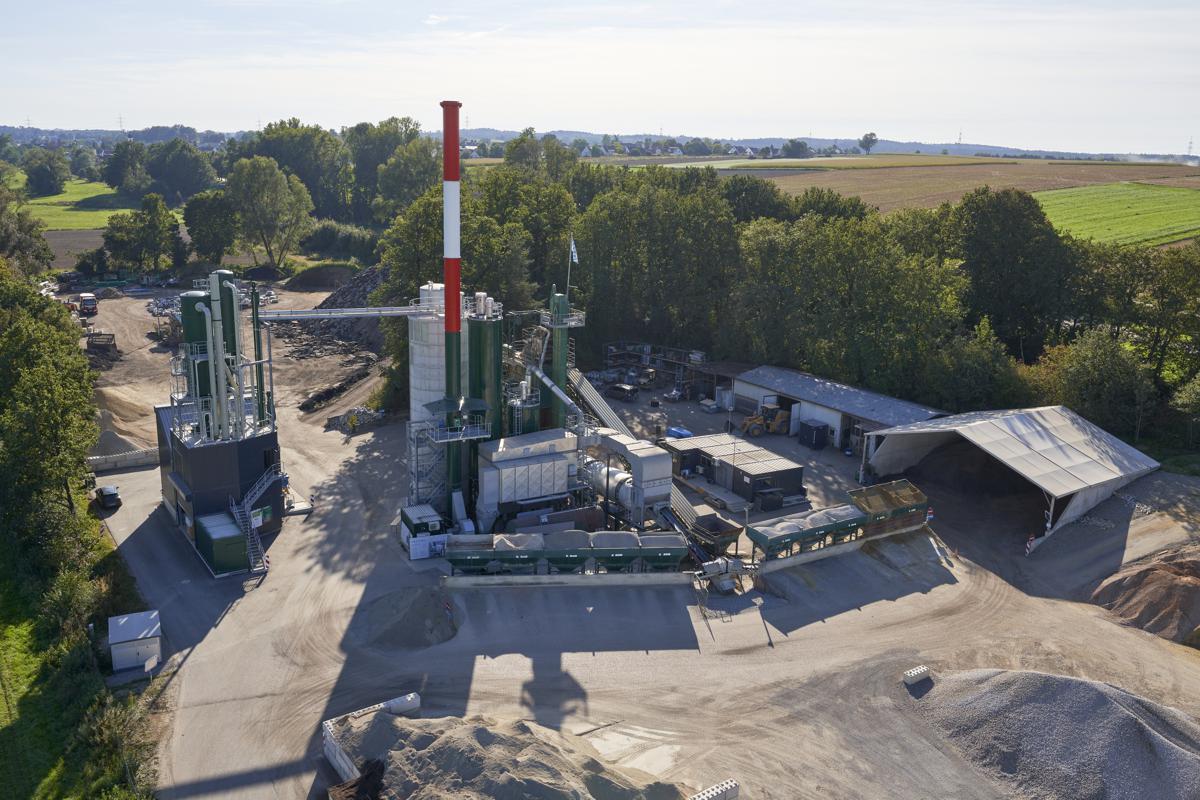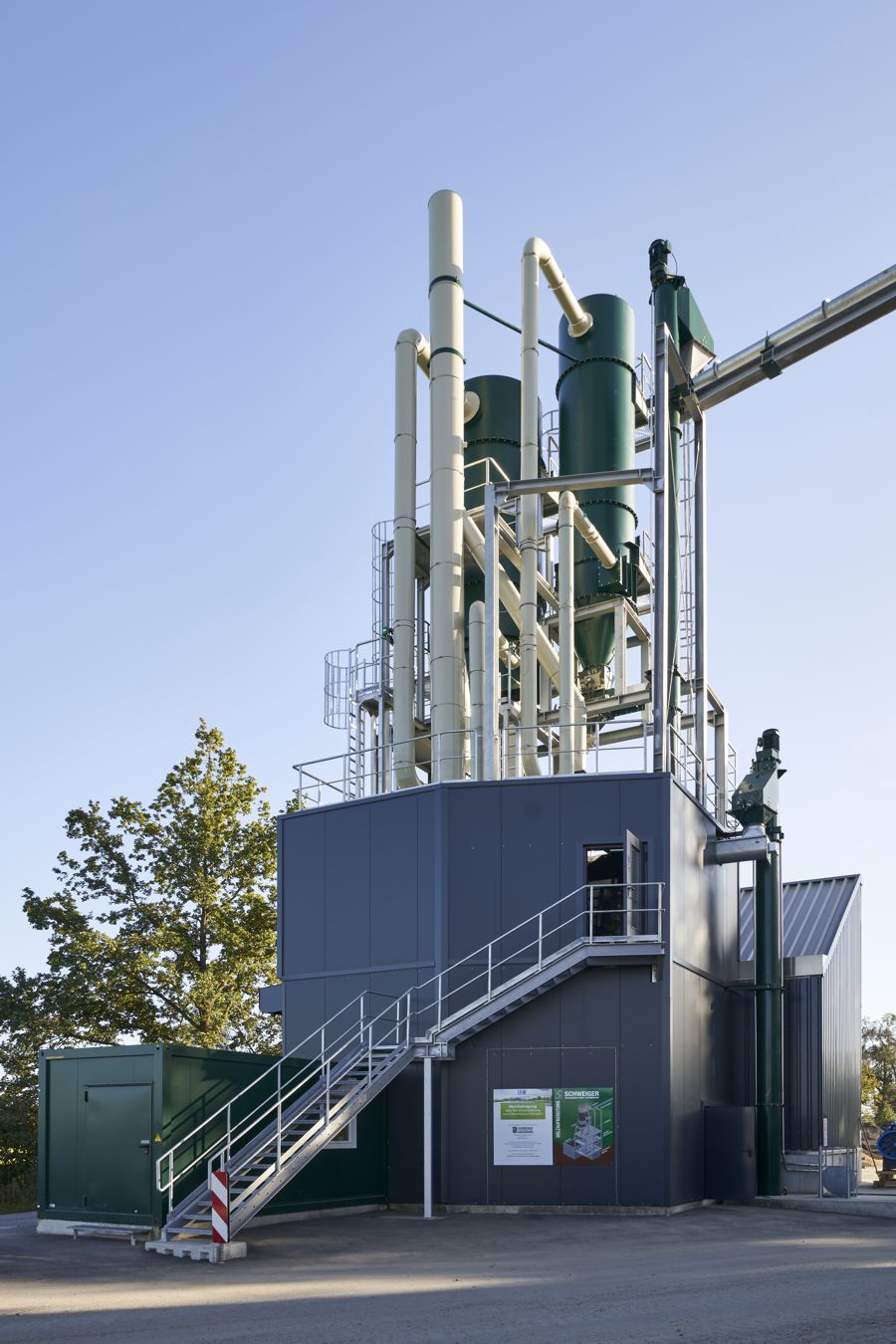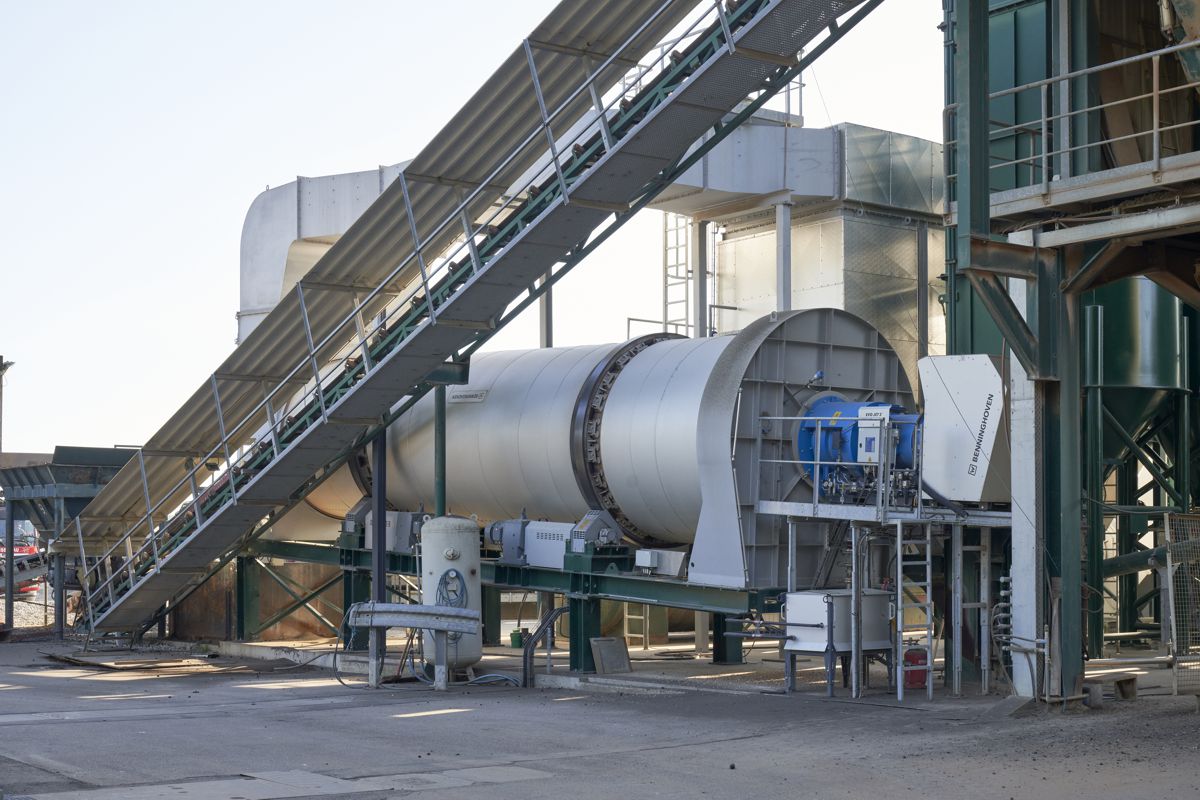Powering an Asphalt Mixing Plant with a Wood Dust Burner
A road construction company from Altomünster in Germany demonstrates how a little brainstorming can turn into a lighthouse project.Christian Schweiger had the idea to run his asphalt mixing plant in Aichach with regenerative energy and achieve virtually carbon-neutral production in the future.
To implement this bold plan, he contacted Benninghoven – the first point of contact for sustainable asphalt production. Around four years later, in September 2023, the first virtually carbon-neutral asphalt mixing plant has started operating, fuelled with wood dust instead of heating oil.
Wood dust as an energy source
The asphalt mixing plant in Aichach used around 600,000 l of heating oil per year to produce approx. 60,000 t of asphalt per year. That meant emissions of 1,800 t of CO₂ – a level that Christian Schweiger was no longer prepared to accept. A look at other European countries gave him the idea of using wood dust instead of heating oil as an energy source.
This alternative fuel is already being used successfully in Scandinavia, but so far not on the German market.
Competent partners join forces
Searching for a partner for this idea, the entrepreneur approached Benninghoven at bauma 2019 and quickly sparked the manufacturer’s interest. Schweiger and Benninghoven have been working together for many years and have implemented various Retrofit measures together.
“Our collaboration has been growing over many years,” says Christian Schweiger. “There is a high level of mutual trust and we knew that we wanted Benninghoven as our partner.”
As a world market leader for multi fuel burners, Benninghoven recognised the great future potential of wood dust as a fuel and the opportunity to expand its own burner technology portfolio. The processing technology required for producing high quality wood dust was provided by a specialist company. That meant the project was ready to go.

Official guidelines
The endeavour was designed to be a research and development project from the outset. Christian Schweiger first obtained the grant applications and the expert’s reports for fire safety, noise and emissions – a lengthy approval process as the authorities had no experience figures to fall back on.
Various requirements specified by the district administration had to be complied with, including continuous emissions measuring and the burner output.
Taking into account the plant output, Benninghoven restricted the burner output to 12 MW/h. In the event of a future expansion of the plant, the burner has enough reserves to support the growth – an aspect that had been particularly important to Christian Schweiger.
Top values achieved for TA-Luft
All requirements centred around complying with the new German TA-Luft regulation which came into force in 2021. Only 4 weeks after installation of the burner, the Benninghoven development engineers were able to achieve levels 50 % below the requirements of the TA-Luft in continuous emissions measurements.
Measurements carried out by the TÜV inspection association impressively confirmed these values . Benninghoven is the only manufacturer who meets and can therefore guarantee the limits for the plant with a wood dust burner.
For Christian Schweiger, the investment has been worthwhile – also financially, as the carbon tax on fossil fuels has increased significantly. “At the start of the project, we thought that sustainability will be an asset in the future. That we are already saving around 20 % of the costs due to the change to wood dust was a positive surprise.”
Christian Schweiger, contractor and operator of the mixing plant in Aichach, said: “We have already saved around 20 % of the costs due to the change to wood dust.”
The EVO JET: the core
By adding wood dust to the EVO JET multi-fuel burner as another energy source, Benninghoven has opened up this sustainable fuel for use in asphalt mixing plants. Wood pellets, wood chips or wood dust are the raw materials.
These have to be ground down to a defined particle size to ensure efficient heating. The wood dust is fed into the burner with precision dosing by means of the supply fan and the dosing unit.

The Benninghoven burner guarantee
All burners are checked thoroughly before they leave the factory, this applies not only to new developments, but to all burners as a rule. Each burner has been run on the test rig, has undergone function checks and safety tests and was preconfigured specifically for the customer’s fuel of choice – wood dust in the case of Schweiger.
Only an optimally configured burner can offer optimum consumption and meet the required emissions limits. That is the Benninghoven burner guarantee: 100 % final inspection, including mechanical, electrical and process testing
A precedent for other manufacturers
Of course word about the innovation project quickly got around in the industry. Renowned asphalt manufacturers came to Aichach to learn more about the new development.
Christian Schweiger is very open about his project: “The experiences that we are gaining should also be available to others. Everyone is looking for ways to cut carbon emissions, and this is an easy way.”
Christian Schweiger, contractor and operator of the mixing plant in Aichach, said: “The question is: Where do I buy my asphalt? Do I decide to emit a lot of CO₂ in the future or – as in our case – almost zero?”
Grand opening at Schweiger
The wood dust burner was officially commissioned on 15/9/2023. Guests from politics and business, in addition to members of the press had been invited to the grand opening.
For Schweiger, the informal event was a good opportunity to shine the spotlight on sustainability once again. “The question is: Where do I buy my asphalt? Do I decide to emit a lot of CO₂ in the future or – as in our case – almost zero?”
Christian Schweiger, contractor and operator of the mixing plant in Aichach, said: “The experiences that we are gaining should also be available to others.”
Retrofit pays off
The solution has been implemented, the plant is running successfully and falls below the limits of the TA-Luft regulation during operation with continuous emissions measurement: Good reason for Benninghoven to offer the EVO JET multi-fuel burner as a Retrofit solution with wood dust and with other energy sources. A burner can be replaced in a little as a week. The economic and ecological optimisation of existing plants makes it possible even for owners of older asphalt mixing plants to take this important step to ensuring their competitiveness and future viability.
“Of course, using wood as a fuel can only be a temporary step,” explains Christian Schweiger, but “I get the impression that, here in Germany, we often try to find the final, perfect solution instead of first just doing what is better, but maybe not perfect.”
Don’t wait, act now: Any step counts, no matter how small!
Christian Schweiger has shown that it is possible to make an important contribution to climate neutrality through innovative ideas and drive – a true pioneer and an inspiration for the industry!





























